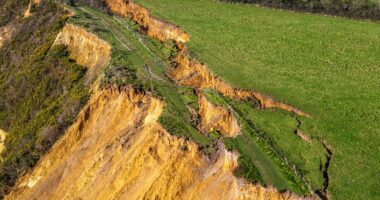Share this @internewscast.com
Soaring real estate values have significantly enhanced the wealth of Australians, propelling the nation to the third spot on the global wealth leaderboard—a remarkable ascent unmatched by any other country.
As per the Allianz Global Wealth Report 2025, which evaluated household financial assets worldwide in 2024, the typical Australian now boasts $684,000 in net financial and real estate assets per capita.
Leading the pack, Switzerland showcases net assets surpassing $1 million, with the United States following at $902,000.
The top two positions have seen little change over the years, yet there have been significant shifts within the top 10 rankings.
Twenty years ago, Taiwan, Sweden, and Australia were absent from this prestigious circle, which then included Belgium, the UK, and Japan.
In contrast, China has climbed to 31st place, advancing nine positions since 2004.
Globally real estate assets grew to $284trillion, more than twice the speed in 2024 than in the previous year.
A Cotality report released on Tuesday valued Australian residential real estate at $11.8trillion, an increase of $678billion in the past year alone with Australians owing $2.5trillion on their mortgages.

Australia has moved up seven places on the Allianz Global Wealth Report for 2025 since last year (a chart from the report is pictured)

Rising property prices have boosted Australians’ personal wealth, pushing the country to third place on the global rich list – the biggest jump of any nation (pictured, Sydney’s Bondi Beach)

Australia’s runaway house prices have contributed to the bulk of the population’s wealth (pictured, homes in Sydney’s wealthy eastern suburbs)
Australian head of research, Eliza Owen, said the milestone was testament to the resilience of Australia’s property market, where national home values are up nearly five per cent over the past year.
‘If the property market were to continue at its current rate of growth, it’s possible the combined market value could hit $12trillion by the end of the year,’ she said.
It’s a different story overseas with home prices in Western Europe barely moving, while in France and Germany, prices are falling across the board.
‘Real estate markets in Australia and New Zealand, as well as in Eastern Europe, seem immune to all interest rate turbulence and continue to rise steadily,’ the report said.
Escala Partners high net worth investment advisor Ben James said the rapid surge in wealth of Australians is attracting the interest of global wealth managers.
‘Globally, we see a lot of interest in the Aussie market,’ Mr James told the AFR.
‘It’s an industry with massive tailwinds. The superannuation system has had mandated growth of 9.5 to 12 per cent over the years.
‘We’re seeing more and more fund managers, especially in the alternatives space, who want to bring their differentiated product to Australia.’

Switzerland has overtaken the US to take the number one spot in the latets global wealth report

The reports warns there is potential for stock markets to fall in coming years especially given the uncertainty surrounding the impact of AI on the economy (pictured, Bondi Beach)
The report warned of the possibility of a sharp market downturn.
‘Global financial assets are expected to continue growing in 2025, albeit at a much slower rate than in the previous two years,’ it said.
‘While stock markets remain in positive territory and have proven resilient to political turmoil, valuations are high by historical standards especially in the US… this makes the potential for a setback correspondingly large.’
The report found the medium-term outlook is even more uncertain due to the undetermined impact of how AI will shape the economy and markets in the future.
‘Forecasts range from a new industrial revolution leading to a golden age, to only marginal changes comparable to the digital ‘revolution’ we have seen so far,’ it said.
‘While this revolution has undoubtedly had, and continues to have, a disruptive impact on society, it has left hardly any trace in productivity statistics so far.
‘It will probably take several years before we can reliably determine which narrative will ultimately prove true.’
















